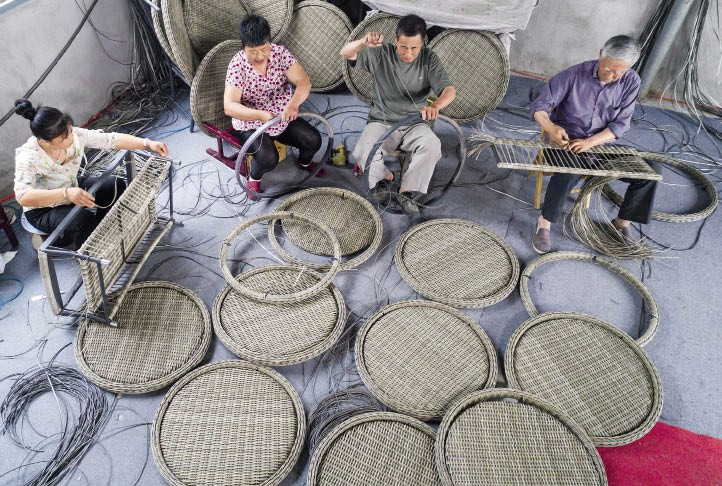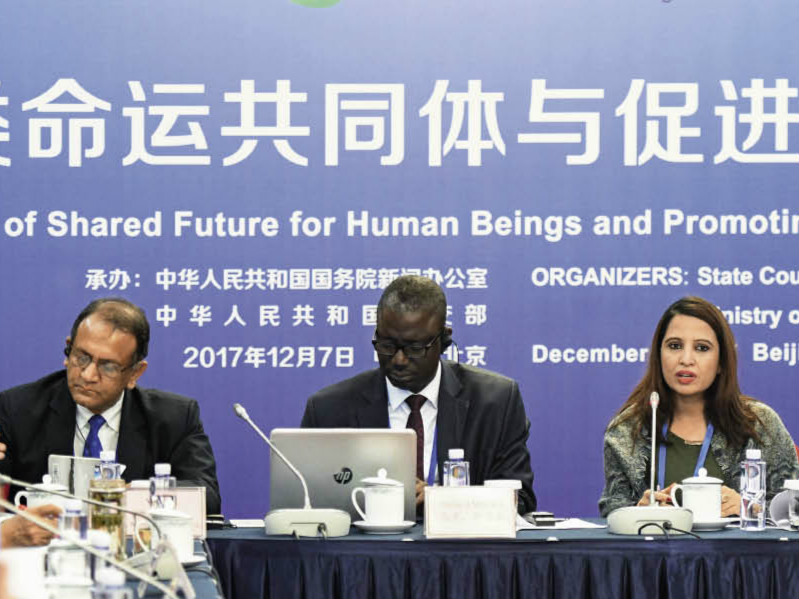SINCE the founding of the People’s Republic of China in 1949, the Chinese people have had their sense of gain, happiness, and security continue to rise. They have never enjoyed such a broad range of human rights as they do today. China, for many years, has been elected a member of the UN Human Rights Council with an overwhelming majority of votes, fully demonstrating the international community’s endorsement of China’s human rights cause.

The physically challenged residents weave rattan articles in a cooperative in Yazhou Town, Hai’an City, Jiangsu Province on June 13, 2019.
Ensuring the People’s Rights to Subsistence and Development
For a people and a nation, the right to subsistence is the premise and basis for other human rights.
Data show that before the founding of the New China in 1949, the people were generally living in poverty in China, and the average life expectancy was less than 35 years. The average period of schooling was less than one year, and about 90 percent of the Chinese were illiterate. The people had always lived through wars and suffering, and there was no sense of happiness.
During the past 70 years, China’s human rights situation has fundamentally changed. People’s lives have achieved a historic leap from poverty to assured access to adequate food and clothing and then to a well-off society. China’s population has grown from 540 million to about 1.4 billion; life expectancy has grown to nearly 77 years, and the average period of schooling has reached 11 years for the population. In 2018, the national grain output jumped to 657.89 million tons. China has managed to feed the world’s largest population with limited arable land. Its citizen’s right to subsistence is well protected.
Especially since the reform and opening-up kicked off in 1978, China has helped more than 700 million people get rid of absolute poverty. Jim Yong Kim, former president of the World Bank, pointed out in 2017 that China’s achievements in poverty reduction over the past few years were one of the greatest events in human history. The world population suffering from extreme poverty has fallen from 40 percent to 10 percent, with major contributions made by China.

Building a Community of Shared Future for Human Beings and Promoting Global Human Rights Governance, a parallel session of the South-South Human Rights Forum, is held in Beijing on December 7, 2017.
Comprehensively Coordinating and Protecting All Human Rights
In fact, the human rights advocated by China are not only the rights to subsistence and development, but also rights in politics, economy, culture, and society. The development of China’s human rights cause has adhered to the principle of coordination and balanced promotion of all human rights.
The Chinese Constitution clearly stipulates that all power of the People’s Republic of China belongs to the people. It provides that except persons deprived of political rights in accordance with the law, Chinese citizens who are 18 years old and above, regardless of ethnicity, gender, occupation, family origin, religious beliefs, educational level, property status, wealth, and duration of residence, have the right to vote and the right to stand for election.
In China, there are many religions, such as Buddhism, Taoism, Islam, and Christianity. The Chinese Constitution stipulates that citizens have freedom of religious belief.
China has the largest number of Internet users in the world. Up to December 2018, the number of Chinese netizens reached 829 million, and the Internet penetration rate reached 59.6 percent. Netizens access news and are able to post comments online. The Internet has become an important channel for the Chinese government to understand public opinion. In addition, citizens’ right of personality, property rights, work rights, social security rights, health rights, cultural rights, and other economic and social rights are effectively guaranteed.
China has also established the largest social security system in the world. By the end of 2018, the number of people with access to basic pension insurance reached 942 million, and basic medical insurance covered 1.35 billion people. The prevalence of compulsory education has reached the average level of high-income countries in the world.
Effectively Protecting the Rights and Interests of Vulnerable Groups
In particular, China has specifically guaranteed the rights of women, children, the elderly, people with disabilities and ethnic minorities through legislation, and has incorporated relevant matters into the overall plan for national economic and social development, so that special groups can better share the achievements of the economic development.
At present, China has formed a legal system protecting women’s rights and interests based on the Constitution. The system includes more than 100 sets of laws and regulations, protecting women’s rights to employment and work.
China also attaches great importance to the protection of children’s rights. In addition to provisions in the Civil Law and the Criminal Procedure Law, China promulgates special laws for the protection of rights and interests of the minor, including the Law on the Protection of Minors, and the Law on the Prevention of Juvenile Delinquency. Also, the National Development Program for Children (2011-2020) and the National Development Plan for Children in Poor Areas (2014-2020) have improved the system for the protection of children’s rights and the care service system.
Since 2012, China has revised the Law on the Protection of the Rights and Interests of the Elderly, and issued more than 70 policy documents, such as Several Opinions on Accelerating the Development of the Elderly Care Service Industry and The 13th Five-Year National Old-Age Career Development and Pension System Construction Plan, initially establishing a pension law and policy system.
China has now established a relatively complete system of laws and regulations for physically challenged people. By April 2018, there were more than 80 laws and 50 administrative laws and regulations directly related to the protection of the rights and interests of the population. Protection for the group has been included in the national development strategy, and seven five-year development plans for the cause of the disabled have also been promulgated.
China has implemented the system of ethnic autonomy in regions inhabited by ethnic groups. At present, there are 159 regions inhabited by ethnic groups across the country that have achieved regional autonomy. All ethnic autonomous areas enjoy extensive autonomy in accordance with the law.
During the past 70 years, China has facilitated a large number of aid projects, such as poverty reduction, education, health, infrastructure, and agricultural production, to developing countries in Asia and Africa. It has played an important role in safeguarding and promoting people’s livelihood, highlighting China’s sense of responsibility in promoting the common development of mankind as a major country.
From 1950 to 2016, China had provided more than RMB 400 billion (US $56.65 billion) in aid to foreign countries and implemented more than 5,000 foreign aid projects. Till 2018, China had dispatched 26,000 medical workers to 72 countries and regions, and provided medical services to 280 million patients, saving countless lives.
China has acceded to 26 international human rights conventions and earnestly fulfilled its obligations under international human rights treaties. Up to August 2018, China had submitted 26 performance reports to treaty bodies for a total of 39 issues and accepted 26 reviews.
China actively participates in global human rights governance, and shows support for the concept that “the rights to subsistence and development are the primary and basic human rights” in the UN General Assembly and the Human Rights Council. China insists that all human rights should be promoted in a coordinated manner and advocates the unity of universality and particularity in human rights protection. It emphasizes such concepts and propositions on human rights as promoting development through cooperation and promoting human rights through development. China plays a leading role in the development of human rights in developing countries and the world.
NING SHUGUANG is a research fellow at the Contemporary China and World Research Institute.





